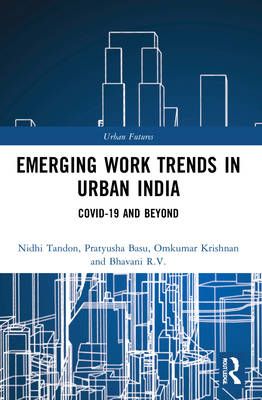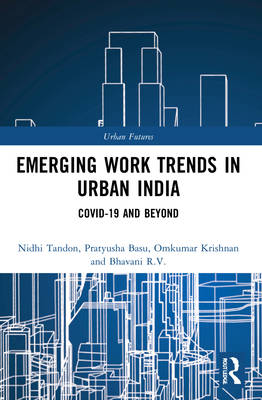
- Retrait gratuit dans votre magasin Club
- 7.000.000 titres dans notre catalogue
- Payer en toute sécurité
- Toujours un magasin près de chez vous
- Retrait gratuit dans votre magasin Club
- 7.000.0000 titres dans notre catalogue
- Payer en toute sécurité
- Toujours un magasin près de chez vous
Emerging Work Trends in Urban India
Covid-19 and Beyond
Nidhi Tandon, Pratyusha Basu, Omkumar Krishnan, Bhavani R VDescription
This book offers an overview of India's emerging digital economy and the resulting challenges and opportunities for urban workplaces. It examines contemporary economic and social transformations in India by focusing on how new technologies and policies are shaping urban work practices and patterns. The book emphasizes inclusive and equitable practices that consider the needs of the formal and informal sector workforce as essential to India's urban development. Drawing on cross-disciplinary frameworks, it examines key issues related to work trends in the Indian urban economy and its digital landscapes, including Industry 4.0 and technology-labour nexus, smart cities and innovation, urbanism and consumerism, workplace transitions such as service industry and remote work, digital divide, skill development initiatives, and the impact of socio-economic inequalities and disruptions. The authors provide perspectives on the digital future of urban work in India and other emerging economies in the post-COVID-19 phase, and underscore the importance of enacting balanced policies, remodelling institutions, and equipping the labour force for adapting to new demands related to future employability and investments.
This book will interest students, teachers, and researchers of urban studies, urban sociology, sociology of work, labour studies, human and urban geography, economic geography, urban economics, development studies, urban development and planning, public policy, regional planning, politics of urban development, social and cultural change, urban sustainability, environmental studies, management studies, South Asian Studies, and Global South studies. It will also be useful to policymakers, non-governmental organizations, activists, and those interested in India and the future of the global economy.
Spécifications
Parties prenantes
- Auteur(s) :
- Editeur:
Contenu
- Nombre de pages :
- 208
- Langue:
- Anglais
- Collection :
Caractéristiques
- EAN:
- 9781032205687
- Date de parution :
- 25-09-23
- Format:
- Livre broché
- Format numérique:
- Trade paperback (VS)
- Dimensions :
- 156 mm x 234 mm
- Poids :
- 326 g

Les avis
Nous publions uniquement les avis qui respectent les conditions requises. Consultez nos conditions pour les avis.






